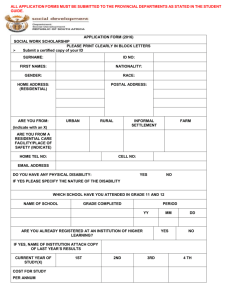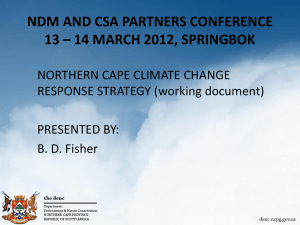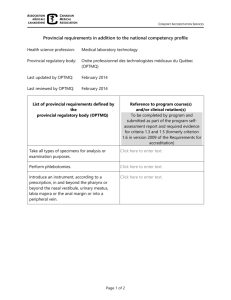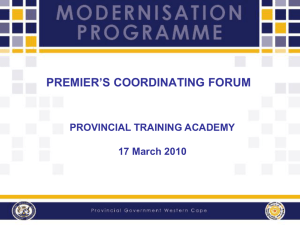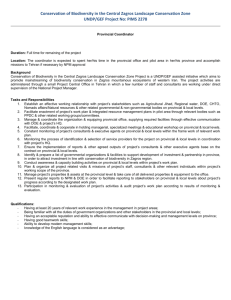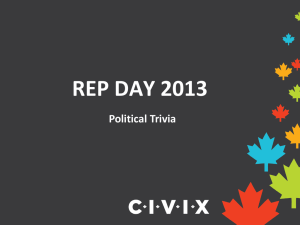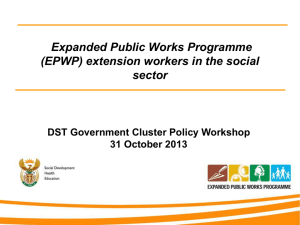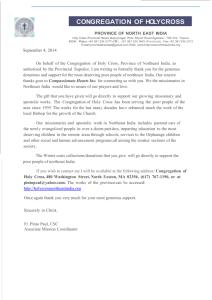open... - North West Provincial TREASURY
advertisement
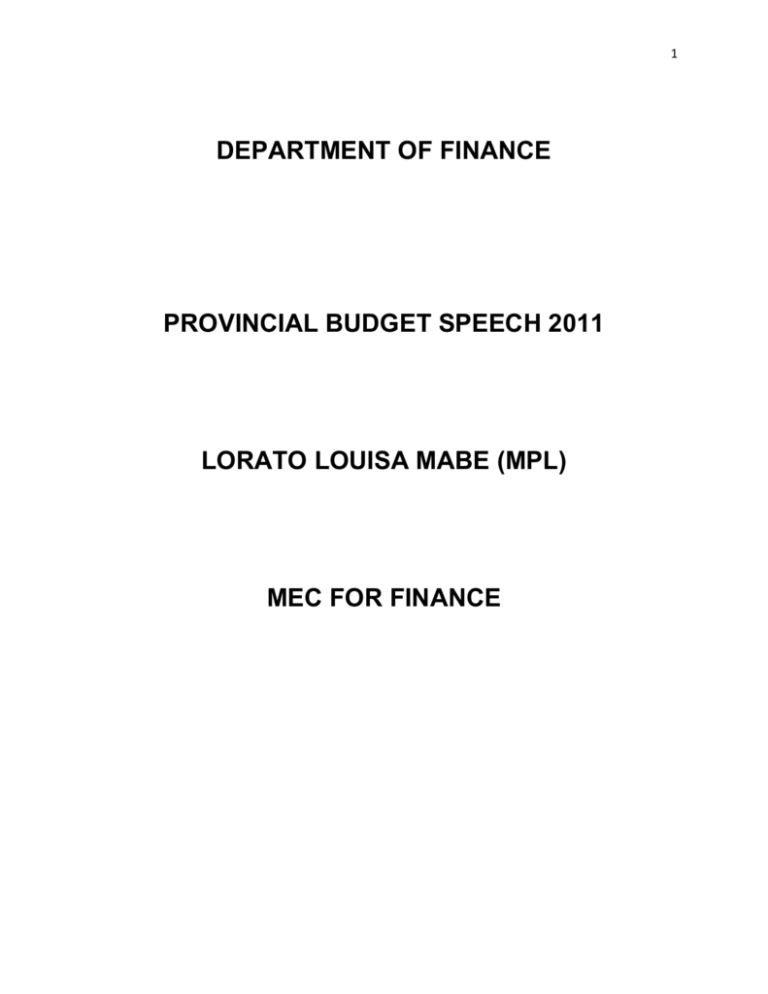
1 DEPARTMENT OF FINANCE PROVINCIAL BUDGET SPEECH 2011 LORATO LOUISA MABE (MPL) MEC FOR FINANCE 2 NORTH WEST PROVINCIAL BUDGET SPEECH 2011 BY HON LORATO LOUISA MABE (MPL) MEC FOR FINANCE PRESENTED TO THE NORTH WEST PROVINCIAL LEGISLATURE ON 08 MARCH 2011 Honourable Speaker of the Provincial Legislature, Honourable Premier of the North West Province, Honourable Members of the Executive Council, Honourable Members of the Provincial Legislature, Honourable Executive Mayors, Mayors and Speakers of Municipalities, Chairperson of the National and of the Provincial House of Traditional Leaders, Kgosi Maubane and Kgosi Mabe, Maapara-nkwe a gaetsho a a re busang, All members of the business, civic and religious societies, All senior officials of departments Distinguished Guests and Fellow Comrades, l send my revolutionary greetings to all of you. Hon. Speaker, it is my privilege and honour to table the 2011 North West Provincial budget. This budget is presented at the time when the economic environment has not yet to receive sufficient funds from national government.Tekanyetso-kabo eno re e tlhagisa ka nako e go leng thata mo moruong re sa kgone go ka dira lotseno le le mothamo o utlwalang. Fela seno ga sea tshwanela go re nyemisa moko go tlisa ditirelo go bagaetsho. But that should not be a stumbling block and excuse for us as a province not to heed the President’s call to create more jobs and more jobs. We have a commitment and mandate that 2011 is the year to pull up all stops in our endeavours to create jobs. 3 The creation of jobs cannot only be the task of government alone. This is the task that needs all of us to jointly work together to create a conducive environment for the creation of jobs. Our people must actively participate in the economy through employment that can contribute towards self-fulfilment and self-esteem that permits them to actively contribute to economic development of their own province and country. Having a job in life gives one the dignity and self-fulfilment for one’s worth. As I table this budget, the people of the North West Province have hope that it will change and bring maximum impact in their lives. But it is also vital that we must make our people understand that our country is not a welfare state. They must participate in their own liberation from economic exclusion. Let us make them understand that government cannot do everything for them but that they must actively help government to lift them out of poverty. It is my privilege to introduce the second budget of this administration that coincidentally is the first budget of Premier Thandi Modise in which she participated at the tail end. Although she joined the North West government at the time when the budget was almost completed, she has put emphasis on the fact that the province must explore its comparative advantage and leverage on exploring beneficiation of both the mining and agricultural products from the primary commodities that we produce as a province. At the time of tabling the national budget, the Minister of Finance indicated that the budget provides benefit to the poor people, workers, business sector, small business, women and the youth. As we table this budget, we must all remember that it is not intended to benefit the same people who have been benefiting from the provincial budget. It must introduce new beneficiaries and participants because the cake must be shared by more people and not few well-known people. A tekanyetso-kabo eno e neye batho botlhe monyetla wa go tsenya letsogo mo go ageng moruo wa rona, go seke ga fiwa batho bale bangwe monyetla ka dinako tsotlhe. 4 Minister Pravin Gordhan has during the presentation of the National Budget indicated that “We have taken on the challenge that the legacy of apartheid left for us – a legacy of disempowerment, landlessness, inequality of opportunity, and millions of unemployed young people who cannot see a realistic prospect of a decent life”. He continued that “now is the time to do extraordinary things in dealing with our particular development circumstances. It requires new ideas and bold efforts from all government, business, labour, communities and every family”. It is true that young men and women in this province possess the life skills and the ability to learn new things. Both government and business must give them the opportunity to put into practice what they have learned and the skills they have acquired because they have no experience of employment. Active involvement in the work environment is the best teacher for young men and women who must be nurtured and incubated to take over serious responsibilities. They have the energy that must not go to waste in wrong life activities. Economic outlook Many emerging economies continue to expand rapidly whereas there is a moderate growth in the US and Europe. It is projected that the contribution of developing countries to the global output will increase to 40 percent by 2015.As a country we have to construct our own growth and development strategies to propel our economy forward, create jobs and compete on the global stage through the New Growth Path. The question that confronts us is: what will be our contribution as a province to make our country’s inclusion in BRIC (Brazil, Russia, India and China) economies beneficial to the people of this province? This remains our immediate challenge as we prepare to review the Provincial Growth Development Strategy in a few days’ time. The New Growth Path implores upon us to focus on key drivers like: Continuing and broadening public investment in infrastructure 5 Targeting more labour-absorbing initiatives in the agricultural and mining value chains, manufacturing, construction and services Promoting innovation through “green economy “initiatives and Supporting rural development and regional integration. The New Growth Path has to unfold in an environment where the price of Brent crude oil has appreciated beyond the US$105 mark, due to political instability in the Middle East. The high oil price impacts negatively on the consumers because when the petrol price increases it has a multiplier effect on the increase of the price of transport, food and other commodities. The price increase poses a risk on inflation or the cost of living. We must support to the Minister of Finance for his commitment to put in place the measures that will ensure that banking charges are fairly set, are transparent and do not create undue hardships on the poor. South Africans are part of the few consumers across the globe that is highly charged by banks for doing business with them. Budget Framework Public finances cannot address all the challenges and backlogs that are part of our lives and history as South Africans. Consequently, as a provincial government we will strengthen our working relationship with the private sector, communities, labour and Dikgosi as we continue to change the lives of our people. Bagaetsho kana kgetse ya tsie e kgonwa ka go tshwaraganelwa, re tshwanetse go dirisana mmogo le ba dikgwebo, badiri le Magosi gore re kgone go dira go tlala seatla. Premier Thandi Modise has emphasised that we must increase the pace at which we deliver services to our people and most of all the quality of services that we deliver. It is vital that we must take bold and decisive actions that will show visible actions to give our people more hope. As a province we do not have the potential to generate sufficient own revenue that can augment the equitable share that we are allocated by national government. We have 6 not borrowed funds for any project for this financial year. By the time we intend to borrow funds we will do so responsibly in order not to burden future generations but also ensure that we deliver quality services with such borrowed funds. Reprioritisation of spending Since the recession, we have been reprioritising spending to redirect funds from noncore items to core priorities of government. National government expects us to generate additional funding from non-core items. We hope that departments will be more vigilant during the coming financial year in doing away with spending on non-core items. During 2010, the national government reviewed the provincial equitable share and the Budget Council endorsed a new formula for Health and a change of weights of the Health, Education and basic components based on surveys that are conducted nationally. The effect on our province is that the equitable share has been revised from 6,7 percent to 6, 8 percent over the medium term. Furthermore, on the 8 December 2010 Cabinet approved a second revision of the basic allocations by cutting budget baselines by 0, 3 percent across all National Government Votes and Provincial budgets. This was intended to address new and outstanding budget issues that arose since the tabling of Medium Term Budget Policy Statement (MTBPS). Hon Speaker, the province did not receive additional funding to address priorities.We received only R591 million that was pre-allocated by national government to the nationally identified functions or departments. EXCO on 2nd March 2011 agreed on the 0, 3 percent budget cut amounting to R308, 434 million across all provincial budget votes in exclusion of the Legislature vote. The funds were reallocated as per the existing pressing priorities. 7 We managed to increase our own revenue from R625 million to R652 million for the 2011/12 financial year. As a provincial government we are determined to reclaim the fifth casino licence that will contribute to own revenue enhancement. We will strengthen the entities and mechanisms that enhance revenue collection over the medium term. Discussions are unfolding with the North West Gambling Board to that effect. Our intention is to pull together our own revenue and invest in infrastructure projects that will make maximum impact on the huge challenges that we experience as a province like roads and water over MTEF. Rather than split own revenue across all departments we will achieve more if we channel those funds to few projects. We therefore appeal to the various departments and the Legislature to support us in such an endeavour .If we do not tighten our belts to support these measures we will not make maximum impact that can register enough progress in economic development of this province. The challenges that confront us require more resilience over the medium term because we will be compelled to seek funds from other sources. We will ensure that as we take these initiatives we will not burden future generations with debt. As we take these steps we will be expected as government to ensure that we receive quality, sustainable products delivered within the agreed times-frames. Some of the projects may need pulling together of resources by national departments, provincial government and municipalities to maximise impact. All these efforts will also bring along the business sector to partner with us because they are part of the beneficiaries of our investment. Hon. Speaker, let me remind ourselves of Premier Modise’s words that: “We are aware that we could have accomplished more. Instead of beating ourselves to a pulp over why we could not achieve more, we should take the imperfections of our past as lessons on how to ensure that the future continues to shape a better tomorrow for our people. Tonakgolo a re re amogele gore bomasepala bana le dikgwetlo tse di rileng mme a di se dire gore re seka ra bona tse di ntle tse di dirwang ke Makhanselara bao ba 8 tshepagalang mme ba dira ka natla. Both the Department of Finance and of Local Government and Traditional Affairs have been reminded to fulfil their legislative mandate of assisting and monitoring the performance of municipalities with the objective of improving and sustaining the services that municipalities deliver. A re direng mmogo le Dikgosi tsa rona segolo thata ka gore porofense ya rona e tletse ka segosi ebile bontsi jwa bona ba ikemiseditse go dira le puso. As a province we are expected to create labour intensive jobs in the next financial year by employing more women, youth and people with disabilities. We fully agree with the Premier that we must introduce a no plan no budget, use it or lose it principle to address under spending and improve spending on core priorities. Re dumelana le Mme Tonakgolo fa a re fa lefapha le sena leano la tiriso ya matlotlo a lese newe madi, fa o sa dirise matlotlo aa tsewe a newe mafapha aa ka dirisang. It is a known factor that water is considered as the key limiting factor to development in the North West. The areas around Dr Ruth Segomotsi Mompati and Ngaka Modiri Molema regions are the worst affected bywater shortage.The problem needs a short to long term solution in partnership with other stakeholders to pull together resources that we have at our disposal. Rural development will be challenged without resolving the water challenges. The water challenge around Haartebeespoort dam cannot be put off the radar screen. We understand the magnitude of this problem and we are determined to work together with all relevant stakeholders. North West province has a comparative advantage in Agriculture. The agricultural sector produces 13 percent of provincial GDP second to mining, and provides jobs for 18 percent of the labour force in the province. This is one area which has great potential for job creation through labour intensity and beneficiation of agricultural products. Water provision remains a cutting edge in this sector for economic development. It is indicated that North West is the fourth largest provincial contributor to GDP at 5, 7 percent after Gauteng, Kwa-Zulu Natal and Western Cape. The province produces 84 9 percent of platinum, 46 percent of granite and 25 percent of gold in the country. Therefore, the province has a huge potential to increase its contribution to the GDP through beneficiation of its raw materials. This effort can make a huge impact in the reduction of unemployment in the province. Ruri re tlhoka go dira difaboriki sa ditswa meepong le tsa dikungwa tsa temo go oketsa bokgoni ba rona, moruo le go tlhola ditiro tse dintsi. 2011 MTEF allocations Hon. Speaker at this moment let us get a microscopic view of what is contained in our 2011 MTEF allocations. The total allocations for 2011/12 is R24, 464 699 billion and increases to R27, 991 121billion in 2013/14. This is an increase of R2,3 billion from the previous financial year. The composition of the budget is as follows: R19, 271 431 billion is the Equitable Share, R4, 541 099 billion is the Conditional Grants and R652, 169million is the Provincial Own Revenue for the 2011 MTEF. The Office of the Premier has been allocated R234, 921 million in 2011/12 increasing to R249, 577 million over the medium term. The Provincial Legislature is allocated R151, 659 million and increases to R164, 769 million over the medium term. The Department of Health receives R6, 321446 billion in 2011/12 and increases to R7.462892 billion in 2013/14. The funds will address issues of increased demands for prevention and treatment for Comprehensive HIV/AIDS, forensic pathology, health infrastructure and maintenance. Department of Sport, Arts and Culture receives R433, 259 million in 2011/12 and increases to R480, 993 million in 2013/14.The allocation includes funds for Community 10 Library Services, Mass Sport and Recreation participation and upliftment of Mmabana Multipurpose Centres. Department of Economic Development, Environment, Conservation and Tourism receives R455, 850 million in 2011/12 and will increase to R476, 166 million. Department of Finance receives R331, 782 million and increases to R513, 790 million. Department of Education and Training receives R10, 261 488 billion in 2010/11 and increases R11, 443 808 billion in 2013/14.The funds include the finalisation of OSD related expenditure in 2011/12.The infrastructure grant increases to R469,967 million in the new financial year .The allocation caters for increased demand for enrolment at FET College. Department of Local Government and Traditional Affairs receives R317, 085 million and increases to R350, 656 million. The Department of Public Works, Roads and Transport is allocated R2,827 075 billion that increases to R3, 327 707 billion in 2013/14.Its allocation includes the funds for Devolution of Property Rates to cover the cost of municipal property rates. The funds will also assist the department to accurately update all relevant information on property ownership and property rates. It is also expected to work together with other departments and municipalities to expand the Expanded Public Works Programme. The department is also expected to speed up delivery on roads and government buildings’ maintenance. The Department of Social Development, Women, Children and People with Disabilities receive R882, 196 million which increases to R994, 013million in 2013/14. The department is expected to contribute to job creation through the Social Sector EPWP lncentive Grant. 11 The Department of Agriculture and Rural Development receives R758, 835 million which increases to R887, 377 million in 2013/14. It has to drive Rural Development and an initial amount of R52 million from the Provincial Own Revenue Fund is set aside to cater for water and other sources of energy as per the State of the Province Address. This amount will be ring-fenced for these initiatives. The funds for the newly settled farmers, emerging farmers and Letsema projects are included in the allocation. The Department of Human Settlements, Public Safety and Liaison receives R1, 489103 billion which increases to R1,639373 billion in 2013/14 and this amount caters for the absorption of North West Housing Corporation staff. The branch of Public Safety and Liaison will have its own budget vote and an accounting officer for effective accountability. Job Creation Hon Speaker, at the end of the budget process we critically analysed the budget to assess its impact on job creation. Over the MTEF the funds that are available amount to R16billion for job creation, of which R5,3 billion is available for this new financial year across provincial departments but in exclusion of local government. The Department of Health receives R589, 467million for infrastructure, EPWP ,Routine maintenance and Hospital Revitalisation Grant that can contribute to job creation. The Department of Education and Training is availed R854,795 million for EPWP, School Nutrition, security at schools, school maintenance and infrastructure grant that must contribute to job creation. The integrated Human Settlements avails R998, 376million for job creation through the provision of housing. The Department of Public Works, Roads and Transport has R2, 214 023 billion for Public Infrastructure construction and maintenance, for transport infrastructure construction (roads) and maintenance and EPWP. The department is expected to champion and coordinate the EPWP programme. Other departments that are expected 12 to also contribute in abig way are Agriculture and Rural Development and Sport, Arts and Culture amongst others. Budget Tips The majority of the budget tips from the North West people to the MEC for Finance were about job creation. This is a clear sign that our people want to work for themselves and not rely on social grants. This view is shared by Azwindwini Regina Muavana who last year advised that government should create more jobs so that people earn money and not depend on social grants. Indeed Regina, it is like you knew what government would prioritise for this year. We believe that the abovementioned departments will utilize such progressive citizens and deliver their projects through labour intensity. Let’s use increased participation of citizens in delivery of projects to create local opportunities for our people to reclaim their self image. Minister Pravin Gordhan is correct when he says that now is the time to do extraordinary things in dealing with our particular developmental circumstances. It requires new ideas and bold efforts from all government, business, labour, communities and every family. All of us must contribute in making a huge dent on unemployment. Thanks to Mosiameng Mothupi of Taung about the view that you raised last year regardingnegative impact of under spending and roll over funds by government. In his view this is poor service delivery and it brings the mandate of government to the brink of collapse. Your views are nothing else but the truth and we have heard you, but please make sure that you use your vote during the government elections to strengthen your voice. Last year Mosimane Gilbert Mochwaedi from Vryburg advised government to review the tendering process and procurement system. Both at national and provincial level we are at an advanced stage of finalising the review process to curb corruption. Last year Boitshoko Nape from Rustenburg advised that we must spend the conditional grant for Libraries and build quality structures than the one in Tlhabane, Rustenburg 13 that was recently completed and had already been destroyed by a thunderstorm. This shows that our people disapprove of poor services that are rendered on behalf of their government. We also appreciate the fact that Boitshoko wants South Africans to be a reading nation. Conclusion Hon. Speaker I would like to thank you for giving us the opportunity to present and table this budget to the Legislature. Thanks Premier Modise and the Executive Council for the support that you availed during difficult times, to Minister Pravin Gordhan and the Budget Council for your support and guidance. Thanks to Mr Paul Serote from the Office of the Auditor General for your partnership during the audit processes. Thanks to all Chairpersons of Portfolio Committees for your vigorous oversight, in particular the Chairperson of Portfolio Committee on Provincial Affairs and Finance Mr Howard Yawa, Chairperson of Public Accounts Committee Mr B Moepeng. Thanks to Accounting Officers and Chief Financial Officers for your cooperation and to Team Finance. Finally Hon Speaker, allow me to table the following documents: North West Appropriation Bill 2011 Revenue and Expenditure Estimates A copy of the Provincial Budget Speech The Peoples’ Guide to the Budget Thanks a million times to everybody Ke leboga botlhe ga some a supa ga supa Baie dankie almal in die Noordwes Provinsie
